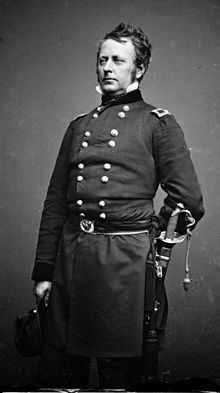Joseph Hooker
| Joseph Hooker | |
|---|---|

Portrait by Mathew Brady or Levin C. Handy
|
|
| Nickname(s) | "Fighting Joe" |
| Born |
November 13, 1814 Hadley, Massachusetts |
| Died | October 31, 1879 (aged 64) Garden City, New York |
| Buried at | Spring Grove Cemetery Cincinnati, Ohio |
| Allegiance |
United States of America Union |
| Service/branch |
United States Army Californian militia |
| Years of service | 1837–1853, 1861–1868 (U.S.) 1859–1861 (California) |
| Rank |
|
| Commands held |
I Corps Army of the Potomac XX Corps, Army of Tennessee Department of the East |
| Battles/wars | |
Seminole Wars
Mexican-American War
American Civil War
Joseph Hooker (November 13, 1814 – October 31, 1879) was a career United States Army officer, achieving the rank of major general in the Union Army during the American Civil War. Although he served throughout the war, usually with distinction, Hooker is best remembered for his stunning defeat by Confederate General Robert E. Lee at the Battle of Chancellorsville in 1863.
After graduating from the United States Military Academy in 1837, Hooker served in the Seminole Wars and the Mexican-American War, receiving three brevet promotions. Resigning from the Army in 1853, he pursued farming, land development, and (unsuccessfully) politics in California. After the start of the Civil War he returned to the Army as a brigadier general. He distinguished himself as an aggressive combat commander leading a division in the Battle of Williamsburg, May 5, 1862, resulting in his promotion to major general. As a corps commander, he led the initial Union attacks at the Battle of Antietam, in which he was wounded. At the Battle of Fredericksburg, he commanded a "Grand Division" of two corps, and was ordered to conduct numerous futile frontal assaults that caused his men to suffer serious losses. Throughout this period, he conspired against and openly criticized his army commanders. Following the defeat at Fredericksburg, he was given command of the Army of the Potomac.
...
Wikipedia
